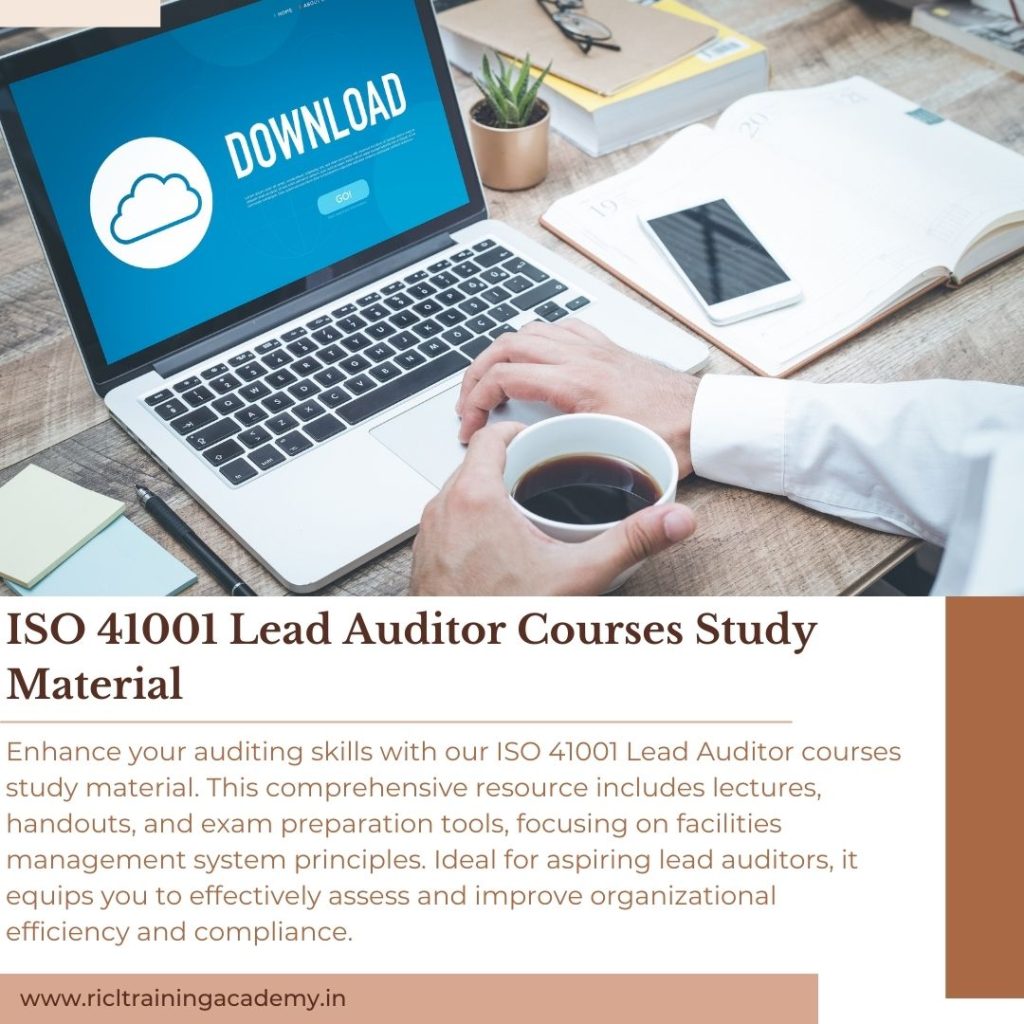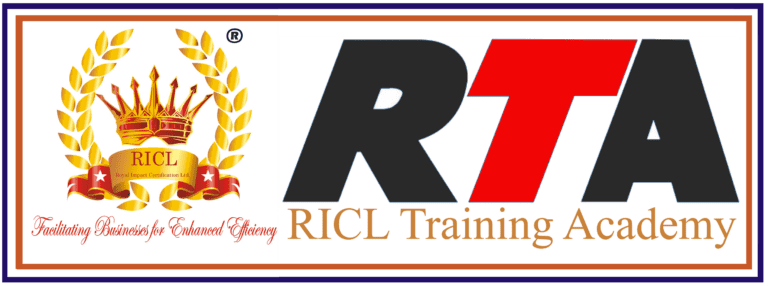Become a certified ISO 41001 Lead Auditor. Master Facility Management System standards to lead audits, ensure compliance, and improve operational efficiency.
ISO 41001 Lead Auditor Course Study Material

Introduction to ISO 41001
ISO 41001 represents the international standard in facility management systems. The standard forms a framework to establish, implement, maintain, and improve an effective facility management system. This standard intends to improve life quality on the built environment while increasing core business productivity through integration of people, place, process, and technology. With the increasing awareness of organizations on the strategic relevance of the facility management discipline, the demand for professionals capable of auditing and assuring compliance to ISO 41001 is continually rising.
Importance of ISO 41001 Certification
ISO 41001 Certification means that an organization follows a systematic and structured approach to manage the facilities, ensuring they meet organizational needs while seeking resource optimization. In simple words, this standard makes sense for organizations in seeking work operational efficiency, cost reduction, and overall workplace improvement. Such certification will also prove to stakeholders that it is committed to doing business in excellence: facility management.
Being accredited as an ISO 41001 Lead Auditor is very essential for any regarded professionals who are desiring to venture into the specialty of auditing facility management systems. This will involve evaluation for compliance by an organization to requirements from the ISO 41001 standard, areas for improvement, and observation of best practices.
The Lead Auditor should plan, conduct, and report facility management systems audits applying the requirements to maintain the validity of ISO 41001. This involves grasping the special demands of the standard, evaluating the efficiency of the management system, and identifying non-conformities. A Lead Auditor has to make an appraisal on whether the facility management system is in line with the strategic objectives of the organization and, where applicable, whether it is contributing to the achievement of these objectives.
This also requires an in-depth understanding of risk management and how it applies in FM. The Lead Auditor needs to find the potential risk in the facility management systems and give a recommendation of corrective action for the same. A lead auditor would also contribute a lot to an organization by helping it to improve its processes in a bid to find a way for connotations of continuous improvement.
Training Material on ISO 41001: Lead Auditor Course
In the case of ISO 41001 Lead Auditor training, the study material of the courses is created so as to provide comprehensive knowledge to the participants on the standard and competencies required in order to conduct audits of a facility management system effectively. The study concentration will cover some of the essential factors:
- An Understanding of the ISO 41001:2018 Standard
This module is aimed at giving in-depth coverage of the standard in terms of structure, key clauses, and requirements. Learners will understand context organization, leadership, planning, support, operation, performance evaluation, and improvement. Thus, the basic knowledge to be acquired about how the standard can be applied within an organization.
- Principles and Practice of Auditing
This study material represents the principles and practices of auditing as stated in ISO 19011, Guidelines for Auditing Management Systems. The course content includes the audit process, types of audits, audit planning, audit execution, and reporting. Participants will be guided in conducting audits that are consistent, systematic, and objective, thus ensuring that the facility management system is effectively evaluated.
- Auditor’s Roles and Responsibilities
If an auditor knows an auditor’s roles and responsibilities itself makes the audit efficient. The study text has the following section that extensively describes a Lead Auditor’s specific duties like; lead an audit team, communicate with client and audit team and make decisions on audit findings. This also includes ethical requirements a code of conduct an auditor should commit themselves to.
- Risk Management within Facility Management
Risk management is an important area in the practice of facility management. The learning resource clearly outlines how the principles of risk management apply to the facility management system. The learners shall acquire knowledge on the ways to identify potential risks, determine the impact, and institute control measures that reduce such risks. The knowledge gained will be useful in providing the facility management system with resilience and adaptability under changed conditions.
- Audit Reporting and Communication
Effective communication is a key competency of the auditor. The material in this study session shall help in going through the main preparations that the audit shall assure that reports are clear, concise, and informative. It shall also cover the best approach to presenting audit findings to the organization’s management. Trainees shall gather the proper presentation of audit findings to assist the organization in its quest to improve its facility management system.
- Case Studies and Practical Exercises
Most of the study materials include case studies and practical exercises for students to try out what they have learned. These would, in essence, offer a simulation of the real-life environments while conducting audits, and an opportunity for the participants to test the same skills they would have acquired in such a controlled atmosphere. Case studies too would shed light on some of the challenges auditors are more likely to face and solutions to those challenges.
- Continuous Improvement and Professional Development
Facilities management is a dynamic environment where development is constant, and auditors need to keep up with it. An emphasis is made on the fact that professional development and continual improvement can be undertaken using the study material. Therefore, participants will learn ways to have their skills updated continuously with developments that affect the ISO 41001 standard and best practice in facility management.
Conclusion
The ISO 41001 Lead Auditor courses intend to provide professionals with knowledge and skills to conduct efficient audits of facility management systems. The study material will ensure an overall understanding of the ISO 41001 standard, audit process, and principles of facility management, which would further assure that the participant becomes a proficient Lead Auditor and enables the organization to attain excellence in facility management for the alignment of systems with strategic objectives.
Lead Auditor & Internal Auditor Training: QMS, EMS, OHSMS + Awareness Courses
Refine your know-how in Quality Management Systems by taking our all-inclusive Lead Auditor QMS training course. We equip you with skills necessary for effective auditing as well as ensuring conformance with ISO standards. It is an excellent resource for people who want to become professionals in QMS auditing through detailed knowledge and practical information.”
Become a certified Lead Auditor in Environmental Management Systems with our specialized training course. This program offers necessary know-how and skills for conducting effective inspections while also promoting environmental compliance according to ISO regulations. The perfect opportunity for those looking to progress their career further into the realm of environmental management”
Pursue your career growth using our Lead Auditor OHSMS training course, which is tailored towards equipping you with the skills needed to undertake comprehensive evaluations of Occupational Health and Safety Management Systems. Obtain practical capabilities as well as experience that guarantee individual workplaces’ security conformity with the most recent ISO requirements”.
Our Internal Auditor QMS training can help you improve your auditing skills. This course covers the principles and practices necessary for conducting internal audits of Quality Management Systems. Ideal for professionals looking to increase their understanding of QMS and contribute to organizational excellence.
Our Internal Auditor EMS course will help you enhance your skills in environmental auditing. Learn techniques and standards needed to implement efficient internal audits of environmental management systems, ensuring ISO compliance and its environmental sustainability.
The purpose of our Internal Auditor OHSMS training is to equip you with the necessary skills to conduct effective internal audits. This course gives an extensive overview on how to audit Occupational Health & Safety Management Systems so that you can achieve compliance and create a safe workplace.
Hone your understanding of Quality Management Systems (QMS) through our Awareness Auditor QMS. These courses provide a basic understanding of the principles, benefits and implementation strategies of QMS making them instrumental for improving quality management practices by individuals or teams.
Familiarize yourself with essential knowledge regarding the Environmental Management Systems by exploring our Awareness Auditor EMS. The courses offer an overview of the principles of EMS which will help you comprehend environmental policies and procedures along with their importance in achieving sustainability targets.
Out training programs on Occupational Health and Safety Management Systems are meant to improve your awareness in this field. This course is intended for organizations and individuals, they provide essential information on OHSMS principles and practices that lead to safer and compliant work environments.
Other Blogs
- Adaptability Thrive in a Dynamic World
- Artistic Sense Elevate Expression & Drive Innovation
- Body Language A Key Form of Non-Verbal Communication
- Business Ethics: Upholding Integrity and Sustainability
- Business Etiquette Cultivating Professionalism and Success
- Business Trend Awareness Stay Ahead & Drive Success
- Collaboration Foster Synergy for Collective Success
- Competitiveness Driving Excellence & Superior Performance
- Conflict Resolution Navigate Tensions for Positive Results
- Crisis Management Strategic Response & Communication
- Critical Thinking Empower Strategic Decisions
- Customer Service Excellence: Fostering Relationships and Driving Success
- Customizing ISO Training for Different Industry Needs: A Tailored Approach
- Dealing with Difficult People Constructive Interaction Tips
- Decision Making: Strategies for Complex Environments
- Delegation Strategic Empowerment for Success
- Design Sense Inspire Creativity & Spark Innovation
- Diplomacy Navigate Relationships & Achieve Goals
- Disability Awareness Embracing Inclusion and Empowerment
- Dispute Resolution Foster Collaboration & Harmony
- Diversity Awareness Fostering Inclusion and Collaboration
- Empathy Enhance Understanding & Build Stronger Connections
- Entrepreneurial Thinking Cultivating Innovation and Initiative
- Facilitation Enhance Group Dynamics Effectively
- Feeling Stagnant in Your Career? Start Here
- Giving Feedback Bridging Performance Gaps Effectively
- Humor A Universal Aspect of Human Experience
- Inspiring Cultivate Authentic Leadership
- Interviewing Skills Effective Communication in Recruitment
- ISO 14001 Lead Auditor Courses PDF Download
- ISO 14001 Lead Auditor Courses Study Material
- ISO 14001: Environmental Management Training Essentials
- ISO 22301 Internal Auditor Courses Material Download
- ISO 22301 Lead Auditor Courses Fees
- ISO 22301 Lead Auditor Courses Material Download
- ISO 22301 Lead Auditor Courses PDF Download
- ISO 30000 Internal Auditor Courses Material Download
- ISO 37001 Lead Auditor Courses PDF Download
- ISO 37001 Lead Auditor Courses Study Material
- ISO 41001 Internal Auditor Courses Material Download
- ISO 41001 Lead Auditor Courses Material Download
- ISO 41001 Lead Auditor Courses PDF Download
- ISO 41001 Lead Auditor Courses Study Material
- ISO 45001 Internal Auditor Courses Material Download
- ISO 45001 Lead Auditor Courses Fees
- ISO 45001 Lead Auditor Courses Material Download
- ISO 45001 Lead Auditor Courses PDF Download
- ISO 45001 Lead Auditor Courses Study Material
- ISO 50001 Internal Auditor Courses Material Download
- ISO 50001 Lead Auditor Courses Fees
- ISO 50001 Lead Auditor Courses Material Download
- ISO 50001 Lead Auditor Courses PDF Download
- ISO 50001 Lead Auditor Courses Study Material
- ISO 50001 Energy Management Training for Sustainability
- ISO 9001 Certification A Comprehensive Training Guide
- ISO 9001 Internal Auditor Courses Material Download
- ISO 9001 Lead Auditor Certificate Course
- ISO 9001 Lead Auditor Certification in India
- ISO 9001 Lead Auditor Courses Benefits
- ISO 9001 Lead Auditor Courses Cost
- ISO 9001 Lead Auditor Courses Exam Question and Answers
- ISO 9001 Lead Auditor Courses Fees
- ISO 9001 Lead Auditor Courses Fees
- ISO 9001 Lead Auditor Courses Fees in Chennai,Noida,Delhi
- ISO 9001 Lead Auditor Courses PDF Download
- ISO 9001 Lead Auditor Courses Study Material
- ISO Certification in Delhi NCR
- ISO Certification in India
- ISO Certification in Noida
- ISO Full Form
- ISO Lead Auditor Training Near Noida
- ISO Training for New Employees: Onboarding and Integration Best Practices
- Latest ISO Training Courses & Certificates
- Lead Auditor Certification
- Lead Auditor Course
- Lead Auditor ISO 14001 Course
- Lead Auditor ISO 22000 Course
- Lead Auditor ISO 45001 Course
- Lead Auditor ISO 9001 Course
- Lead Auditor Online Courses
- Lead Auditor Salary
- Lead Auditor Training
- Lead Auditor Training Provider in Delhi
- Lead Auditor Training Provider in India
- Lead Auditor Training Provider in Noida
- Listening The Cornerstone of Effective Communication
- Adaptability Thrive in a Dynamic World
- Artistic Sense Elevate Expression & Drive Innovation
- Body Language A Key Form of Non-Verbal Communication
- Business Ethics: Upholding Integrity and Sustainability
- Business Etiquette Cultivating Professionalism and Success
- Business Trend Awareness Stay Ahead & Drive Success
- Collaboration Foster Synergy for Collective Success
- Competitiveness Driving Excellence & Superior Performance
- Conflict Resolution Navigate Tensions for Positive Results
- Crisis Management Strategic Response & Communication
- Critical Thinking Empower Strategic Decisions
- Customer Service Excellence: Fostering Relationships and Driving Success
- Customizing ISO Training for Different Industry Needs: A Tailored Approach
- Dealing with Difficult People Constructive Interaction Tips
- Decision Making: Strategies for Complex Environments
- Delegation Strategic Empowerment for Success
- Design Sense Inspire Creativity & Spark Innovation
- Diplomacy Navigate Relationships & Achieve Goals
- Disability Awareness Embracing Inclusion and Empowerment
- Dispute Resolution Foster Collaboration & Harmony
- Diversity Awareness Fostering Inclusion and Collaboration
- Empathy Enhance Understanding & Build Stronger Connections
- Entrepreneurial Thinking Cultivating Innovation and Initiative
- Facilitation Enhance Group Dynamics Effectively
- Feeling Stagnant in Your Career? Start Here
- Giving Feedback Bridging Performance Gaps Effectively
- Humor A Universal Aspect of Human Experience
- Inspiring Cultivate Authentic Leadership
- Interviewing Skills Effective Communication in Recruitment
- ISO 14001 Lead Auditor Courses PDF Download
- ISO 14001 Lead Auditor Courses Study Material
- ISO 14001: Environmental Management Training Essentials
- ISO 22301 Internal Auditor Courses Material Download
- ISO 22301 Lead Auditor Courses Fees
- ISO 22301 Lead Auditor Courses Material Download
- ISO 22301 Lead Auditor Courses PDF Download
- ISO 30000 Internal Auditor Courses Material Download
- ISO 37001 Lead Auditor Courses PDF Download
- ISO 37001 Lead Auditor Courses Study Material
- ISO 41001 Internal Auditor Courses Material Download
- ISO 41001 Lead Auditor Courses Material Download
- ISO 41001 Lead Auditor Courses PDF Download
- ISO 41001 Lead Auditor Courses Study Material
- ISO 45001 Internal Auditor Courses Material Download
- ISO 45001 Lead Auditor Courses Fees
- ISO 45001 Lead Auditor Courses Material Download
- ISO 45001 Lead Auditor Courses PDF Download
- ISO 45001 Lead Auditor Courses Study Material
- ISO 50001 Internal Auditor Courses Material Download
- ISO 50001 Lead Auditor Courses Fees
- ISO 50001 Lead Auditor Courses Material Download
- ISO 50001 Lead Auditor Courses PDF Download
- ISO 50001 Lead Auditor Courses Study Material
- ISO 50001 Energy Management Training for Sustainability
- ISO 9001 Certification A Comprehensive Training Guide
- ISO 9001 Internal Auditor Courses Material Download
- ISO 9001 Lead Auditor Certificate Course
- ISO 9001 Lead Auditor Certification in India
- ISO 9001 Lead Auditor Courses Benefits
- ISO 9001 Lead Auditor Courses Cost
- ISO 9001 Lead Auditor Courses Exam Question and Answers
- ISO 9001 Lead Auditor Courses Fees
- ISO 9001 Lead Auditor Courses Fees
- ISO 9001 Lead Auditor Courses Fees in Chennai,Noida,Delhi
- ISO 9001 Lead Auditor Courses PDF Download
- ISO 9001 Lead Auditor Courses Study Material
- ISO Certification in Delhi NCR
- ISO Certification in India
- ISO Certification in Noida
- ISO Full Form
- ISO Lead Auditor Training Near Noida
- ISO Training for New Employees: Onboarding and Integration Best Practices
- Latest ISO Training Courses & Certificates
- Lead Auditor Certification
- Lead Auditor Course
- Lead Auditor ISO 14001 Course
- Lead Auditor ISO 22000 Course
- Lead Auditor ISO 45001 Course
- Lead Auditor ISO 9001 Course
- Lead Auditor Online Courses
- Lead Auditor Salary
- Lead Auditor Training
- Lead Auditor Training Provider in Delhi
- Lead Auditor Training Provider in India
- Lead Auditor Training Provider in Noida
- Listening The Cornerstone of Effective Communication

TESTIMONIALS
What Our Cutomers are Saying About us

Ruis aute irure dolor in reprehender voluptate velit esse cillum dolore fugiat pariatur sint occaecat cupidata non proie sunt in culpa aui officede









Reach us at:
info@ricltrainingacademy.in
support@ricltrainingacademy.in
sales@ricltrainingacademy.in
complaint@ricltrainingacademy.in
Call us at:
9355650992
9355650993
Visit us at:
Royal Impact Certification Limited
623 Tower -B, The Ithum Sector – 62, Noida, 201301.
Copyright © 2024 RICL Training Academy Team


